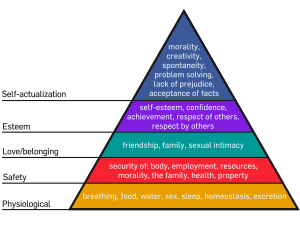Every human being strives to find a place in the world. You tend to surround yourself with people who are similar to you, as in they share the same interests, background, or personal beliefs. Take a look at each of your friends, and ask yourself why you are friends with them. Hopefully, they are individuals who refuse to accept the status quo as the only reality. The world is an enormous canvas and you are one of many painters. Except in our world, the canvas is limitless and constrained only by our underlying assumptions that society has told us.
These assumptions may not always be in a person's best interest. They can prevent you from self-actualizing because they attempt to subdue the power of the individual. They can never steal your thoughts, but they can beat you into the ground until you believe a lie is the truth. In George Orwell's 1984, the individuals are subservient to the government because of fear and manipulation. By the end of the novel, Winston had been tortured and "re-educated" by high ranking government officials. This is a dialogue between Winston and his lover:
"I betrayed you," she said baldly.When basic needs are not met, the potential of the individual is stifled, but not destroyed. When put under atrocious conditions, humans lack the ability to think freely. Removing these constraints leads to clarity and an understanding of human nature. Selfishness is inherent in all humans. Selfishness is certainly logical too. I argue that Winston achieved self-actualization in this dialogue because he looked at his experience and made a conclusion about human nature. He recognized that everyone possesses selfishness, because when it comes down to it, living is what we need.
"I betrayed you," he said.
She gave him another quick look of dislike.
"Sometimes," she said, "they threaten you with something—something you can't stand up to, can't even think about. And then you say, 'Don't do it to me, do it to somebody else, do it to so-and-so.' And perhaps you might pretend, afterwards, that it was only a trick and that you just said it to make them stop and didn't really mean it. But that isn't true. At the time when it happens you do mean it. You think there's no other way of saving yourself and you're quite ready to save yourself that way. You want it to happen to the other person. You don't give a damn what they suffer. All you care about is yourself."
"All you care about is yourself," he echoed.
"And after that, you don't feel the same toward the other person any longer."
"No," he said, "you don't feel the same."
